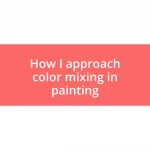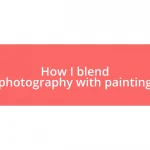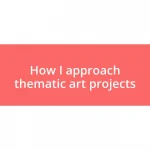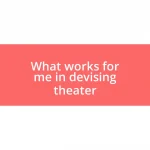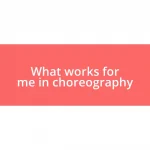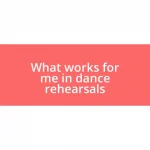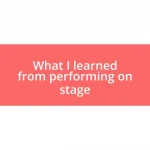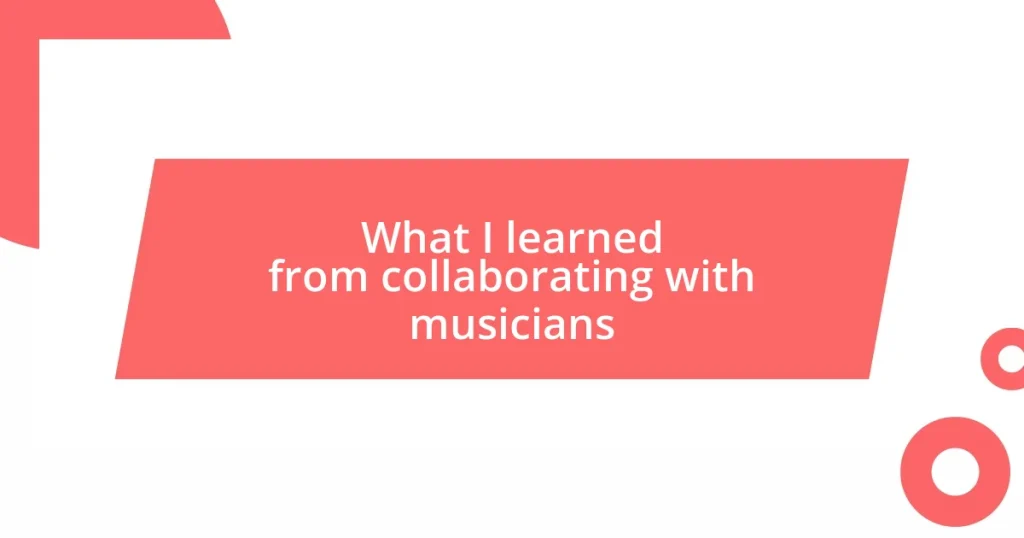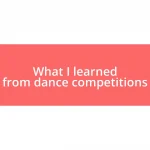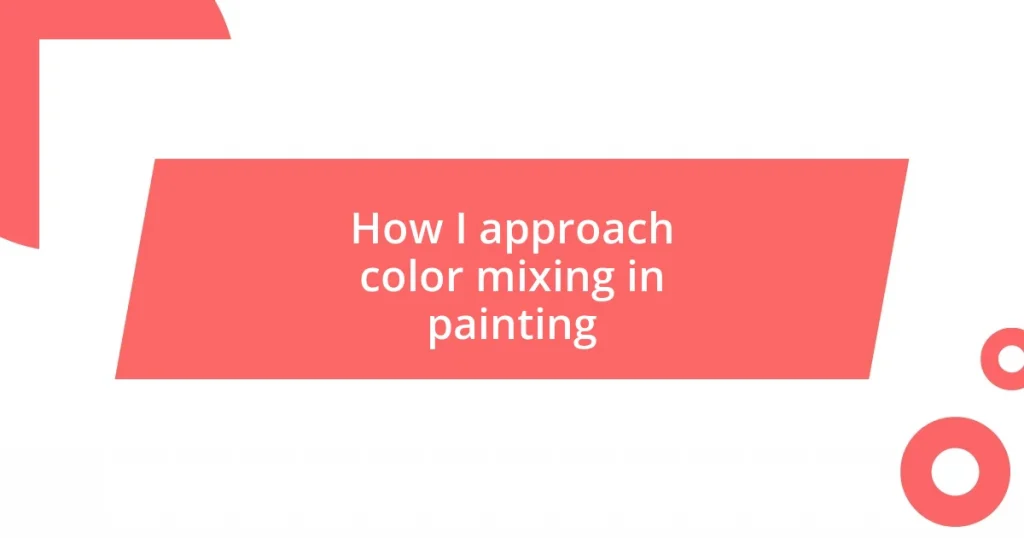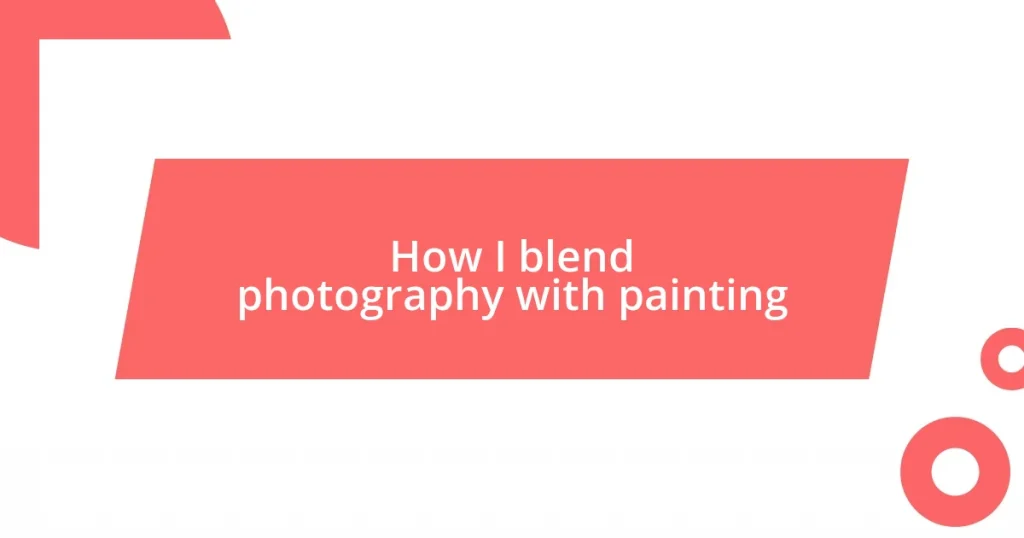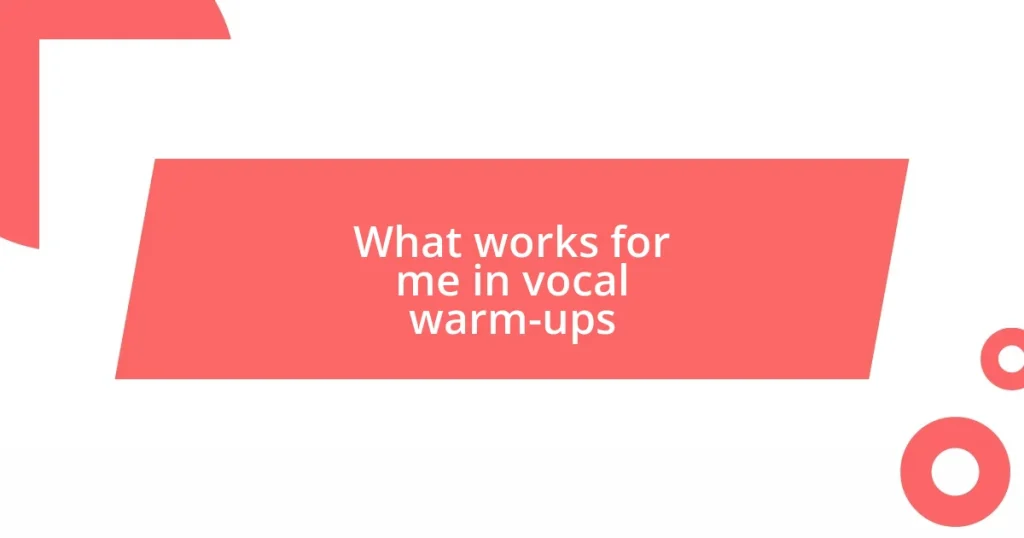Key takeaways:
- Collaboration enhances creativity through the blending of diverse ideas, styles, and emotions, leading to richer musical outcomes.
- Effective communication, including active listening and openness, builds trust and fosters a supportive environment for creativity to thrive.
- Celebrating collective achievements reinforces the bond among collaborators and highlights the importance of shared efforts in the creative process.
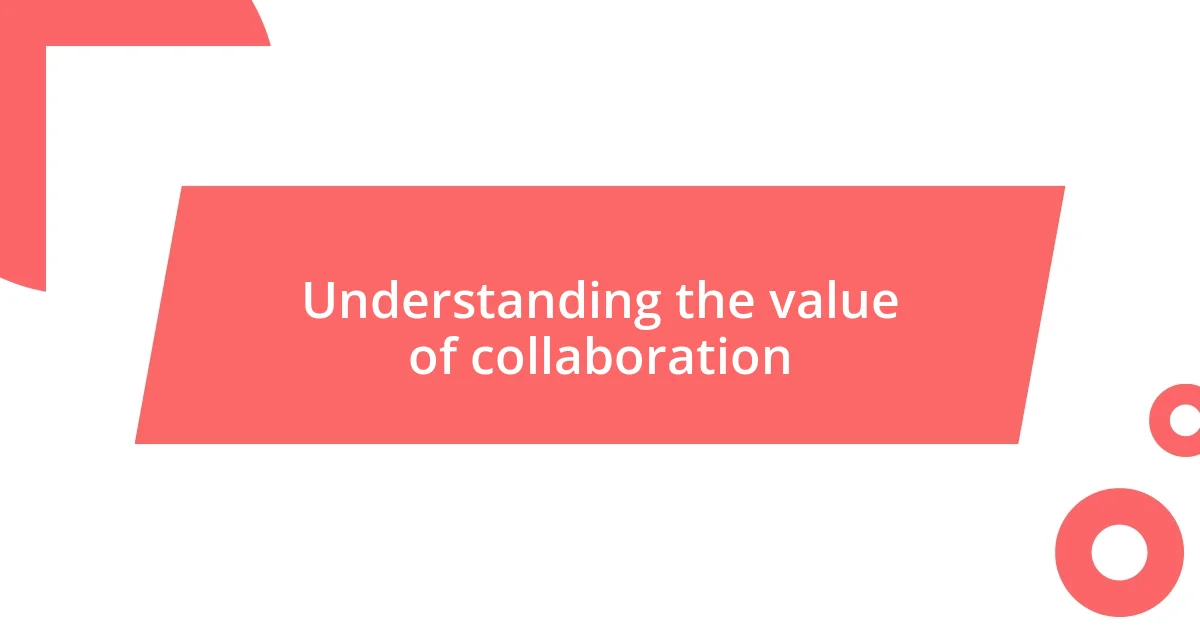
Understanding the value of collaboration
Collaboration has this magical way of transforming individual ideas into something greater. I remember the first time I worked with a group of musicians; it felt like every note was amplified by our collective energy. It’s fascinating how one person’s melody can spark another’s lyric, leading to a creation that feels much more profound than anything we could have accomplished alone.
Think about it: when we collaborate, we tap into diverse experiences and perspectives. Each musician brings their own background and emotions, which adds layers to our work that might be missing in solo efforts. I’ve felt the rush of a jam session where ideas flowed freely, and it was as if we were speaking a universal language. Creating in this environment ignites inspiration and fosters a sense of belonging that’s hard to replicate alone.
There’s also an element of learning that comes with collaboration. I’ve picked up trade secrets and fresh techniques simply by sharing the space with other artists. Has there ever been a moment for you when someone else’s approach changed how you think about your craft? Those insights not only enhance our abilities but also deepen our appreciation for the creative process itself.
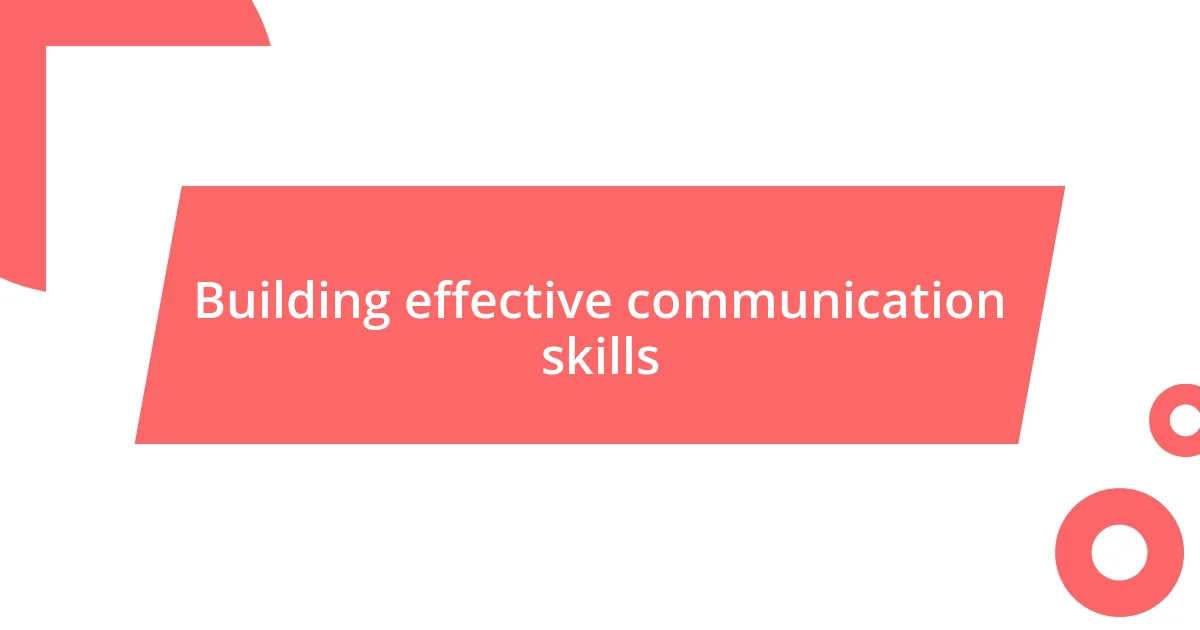
Building effective communication skills
Building effective communication skills in a collaborative environment is crucial. I vividly recall a session where we were all set to record, but the energy in the room felt off. Instead of jumping into it, we took a moment to share our thoughts and feelings about the music. This openness transformed our dynamic, leading to a richer performance where everyone felt heard and valued.
Communication isn’t just about speaking; it also involves actively listening. I’ve experienced countless times when I thought I understood my fellow musicians, only to realize I had misinterpreted their intentions. By focusing on listening rather than just preparing my next response, I found that the music became more cohesive, and that connection often translated into a stronger final piece. Have you ever felt the difference between merely hearing and truly understanding what someone else is trying to convey?
Over time, I’ve discovered that honesty in communication strengthens trust. When I worked with a guitarist who wasn’t afraid to speak up about what didn’t work, it made me feel safe to express my own thoughts too. This fluid exchange of ideas allowed our creativity to flourish. It’s amazing how the ability to communicate openly can elevate not just your craft, but the entire creative process.
| Aspect | Example from Experience |
|---|---|
| Active Listening | Misunderstood a drummer’s intentions until I focused on his cues |
| Openness | Transformed the vibe by sharing feelings before a recording session |
| Trust Building | Honesty with a guitarist led to enhanced creativity |
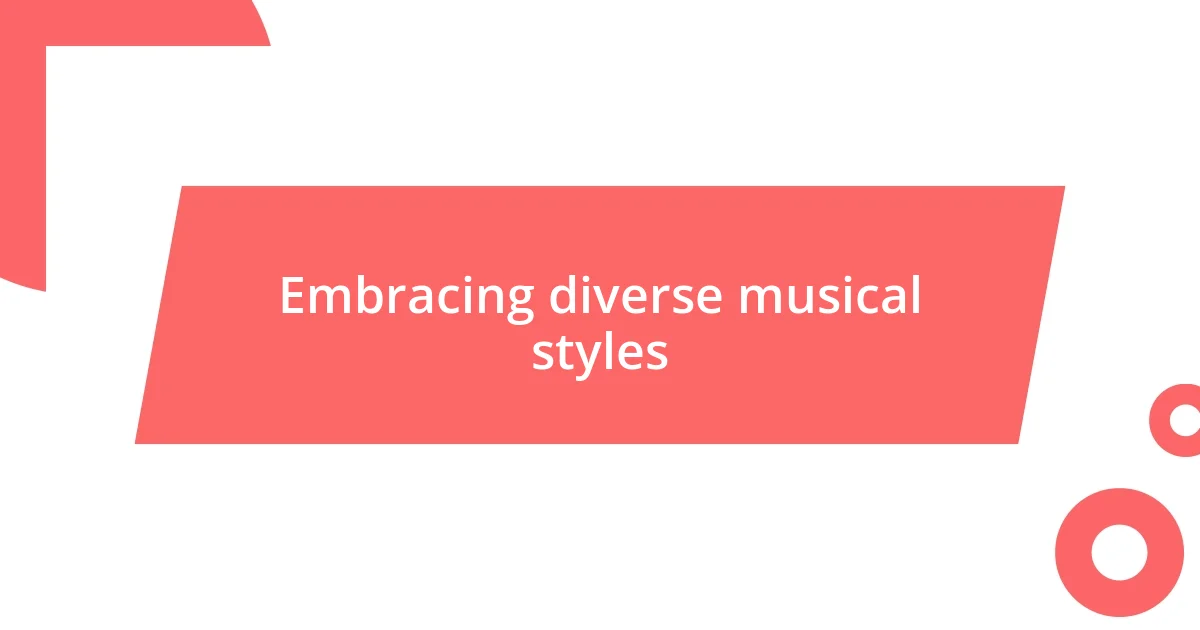
Embracing diverse musical styles
Embracing diverse musical styles has been one of the most eye-opening aspects of collaboration for me. During one memorable project, I worked with a group whose backgrounds ranged from jazz to classical and hip-hop. One afternoon, as we jammed together, I found myself improvising a melody inspired by a jazz riff. The moment I let go of my comfort zone, it felt like the music transcended our individual styles. It was a powerful reminder that blending genres can create something uniquely beautiful.
Here are some key insights I’ve gathered from my experiences:
- Unexpected Harmony: Collaborating across genres can lead to surprise combinations, like a classical violin flourish over a hip-hop beat.
- Learning Curves: I learned techniques from a folk guitarist that reshaped my approach to rhythm; it was like unlocking a new level in my musical toolkit.
- Cultural Exchange: Each musician’s cultural background brought fresh stories and inspirations, enriching our sound and expanding my own musical vocabulary.
Every time I embrace a new style, I’m not just learning an instrument or technique; I’m absorbing new emotions and perspectives that broaden my artistic reach.
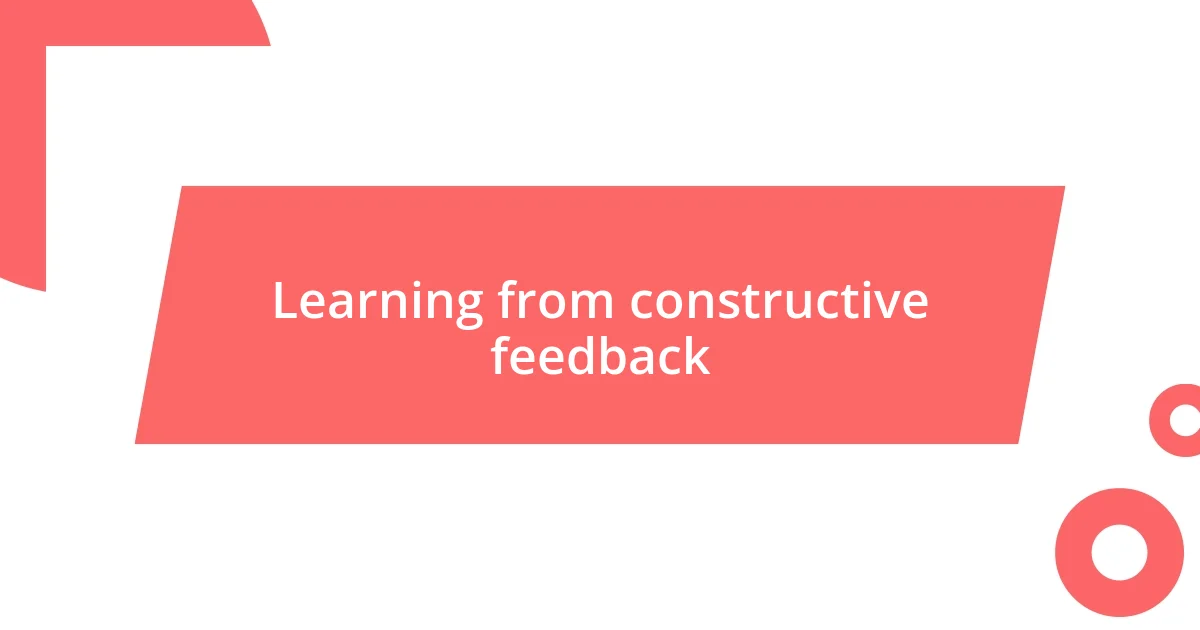
Learning from constructive feedback
Constructive feedback is an invaluable part of the collaborative process. I remember a time during a rehearsal when a fellow musician pointed out that my chord progression felt too repetitive. At first, I bristled, thinking it was fine. But then, I took a step back and tried to embrace her perspective. After tweaking a few notes and experimenting, I discovered new textures in the music that I hadn’t considered before. Isn’t it fascinating how a fresh set of ears can illuminate paths we may overlook on our own?
There’s also something deeply personal about receiving constructive feedback. One day, I shared a piece I was passionate about, only to hear that it sounded a bit disconnected emotionally. Initially, I felt defensive, but I realized that my focus on technical perfection overshadowed the sentiment I aimed to convey. Reflecting on this helped me infuse more vulnerability into my work. Have you ever found that a piece you thought was complete could still evolve and become something even more powerful?
Ultimately, the beauty of constructive feedback lies in its ability to foster growth. Each time I’ve opened myself to honest critiques, the final product has turned out richer and more authentic. I once collaborated with a lyricist who wasn’t afraid to say when a line didn’t resonate with her. It was difficult at first, but I grew to appreciate these moments of honesty. They taught me that the best music often emerges from pushing beyond our comfort zones. How has feedback impacted your own creativity?
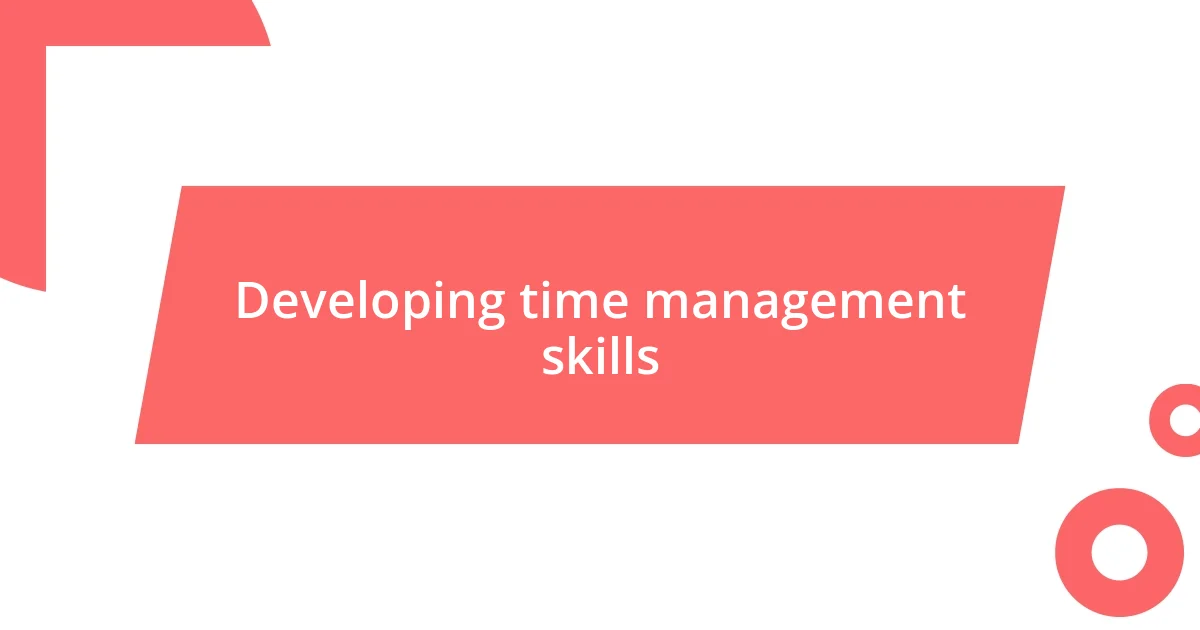
Developing time management skills
Time management is crucial when collaborating with musicians. I vividly recall a project where we had only three days to finalize our set list before a big gig. Trying to coordinate everyone’s schedules while respecting each musician’s creative flow taught me the importance of prioritizing tasks. By dividing our time into structured blocks, we not only met our deadline but also fostered a space for spontaneity and creativity.
Another experience that shaped my time management skills happened during a long-term collaboration. We had agreed to work together on one song each week. At first, I found it challenging to carve out my practice time amidst life’s many demands. However, I quickly realized that setting specific goals helped me stay focused during our jam sessions. I ask myself now, what would I do differently if I had only limited time to create? This consideration prompts me to value every moment I spend with my collaborators.
In the end, I learned that effective time management doesn’t mean sacrificing creativity; rather, it enhances it. The whirlwind of ideas can be exhilarating, but I found that taking a few moments to reflect and assess our progress leads to truly inspired breakthroughs. How do you maintain your creative spark while managing multiple projects? For me, it’s about finding that delicate balance between structure and spontaneity.
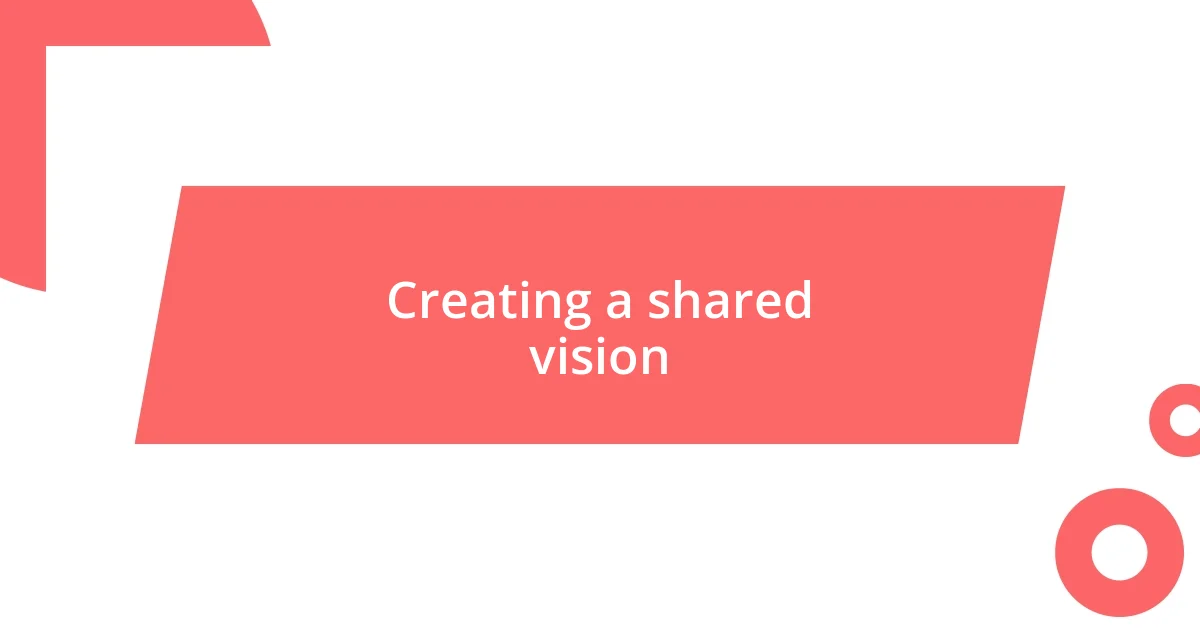
Creating a shared vision
Creating a shared vision is a fundamental aspect of any successful collaboration. I recall a moment when I was working with a diverse group of musicians, each bringing unique influences and styles to the table. It took some initial discussions to align our artistic goals, but once we established a clear vision, the music came together organically. Have you ever experienced that magical moment when everyone is on the same wavelength? It’s truly exhilarating.
Finding common ground requires active listening and mutual respect. I remember brainstorming ideas for a song, and at one point, I hesitated to share an unconventional riff I had in mind. But when I finally spoke up, I was surprised by the enthusiasm it ignited among my collaborators. This reinforced for me that every voice matters; it’s about weaving individual threads into a cohesive tapestry. How often do you feel empowered to share your unique ideas in a group setting?
Ultimately, creating a shared vision transforms collaboration into a collaborative journey. We don’t just make music; we cultivate an environment where creativity flourishes. I believe that when we invest time and energy into crafting this vision together, the artistic process becomes more enriching and rewarding. The thrill of seeing our combined efforts manifest in a song is something every artist should experience at least once. Have you pursued a shared dream in your projects? The rewards are immeasurable.
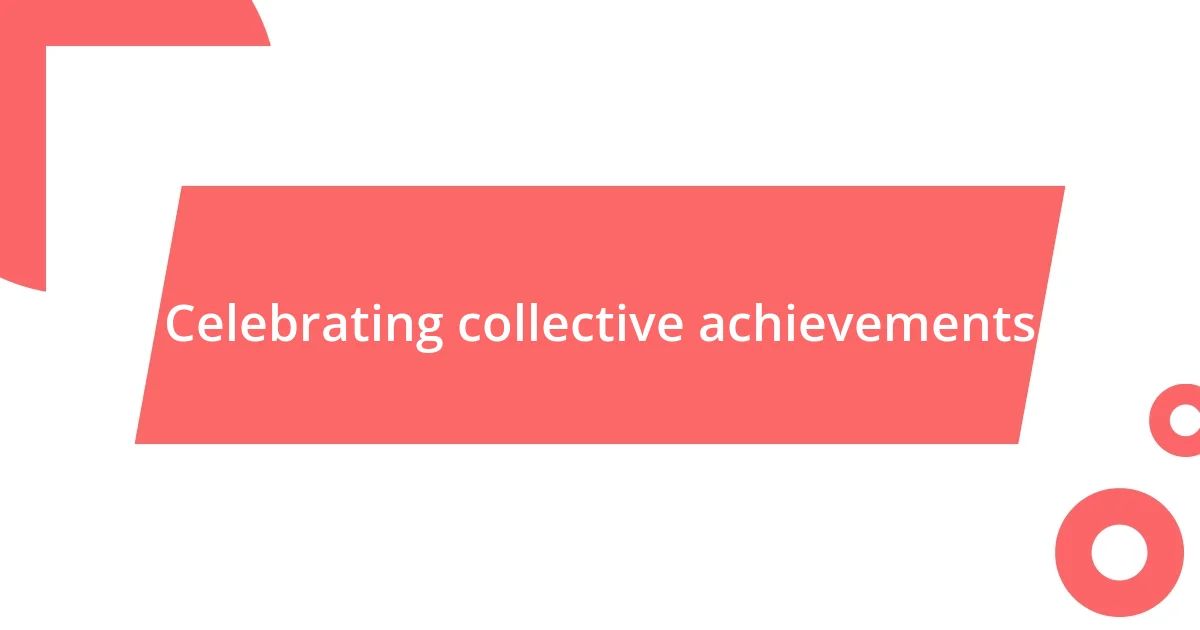
Celebrating collective achievements
Celebrating collective achievements brings a unique joy that’s hard to replicate. I remember the adrenaline rush after completing a live performance with my band. The energy on stage was electric. As we took our bows, surrounded by applause, I felt an overwhelming sense of pride for what we had accomplished together. There’s something profoundly satisfying about realizing that our combined efforts could resonate with an audience. Have you ever felt that rush of collective acknowledgment? It’s a reminder of how collaboration can amplify our individual talents into something greater.
In another project, we organized a small release party for our EP. This was more than just unveiling our work; it was a celebration of every late-night practice and every creative riff shared. The smiles on my collaborators’ faces as we shared stories with friends and fans reinforced the bond we had formed. I think back to the countless hours spent working out harmonies and experimenting with sounds. The moment we finally saw our product being enjoyed reminded me that the process itself is as significant as the end result. How do you celebrate the milestones in your collaborations? For me, it’s those shared moments that fuel our passion and inspire our next ventures.
Witnessing collective accomplishments also fosters a sense of community. I can recall feeling a wave of gratitude washing over me when we participated in a local music festival. Sharing the stage with other musicians I deeply respect made the experience all the more enriching. It wasn’t just about showcasing our music; it was about celebrating the vibrant tapestry that our local scene represents. That feeling of togetherness, rooted in our shared love for music, is something I cherish deeply. Have you ever been part of such a supportive community? It’s an affirming reminder that while the journey is personal, the triumphs are best celebrated together.
